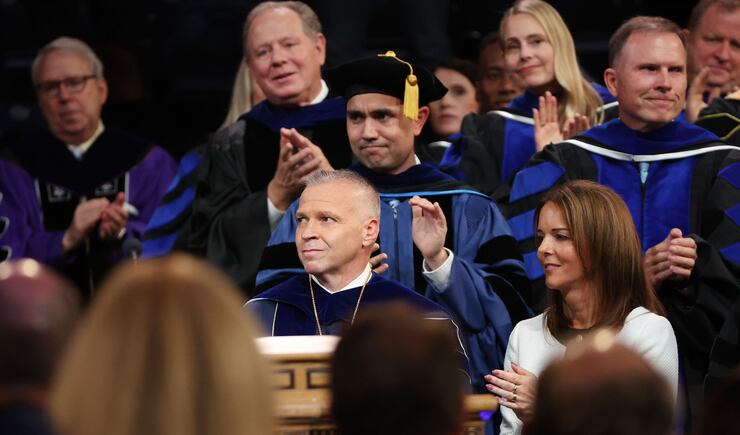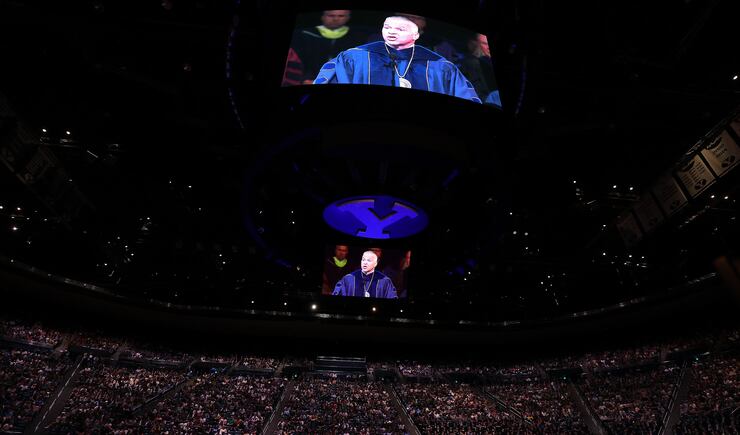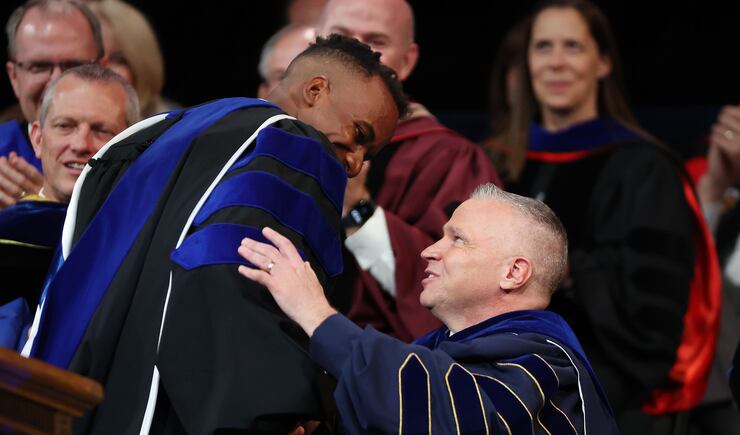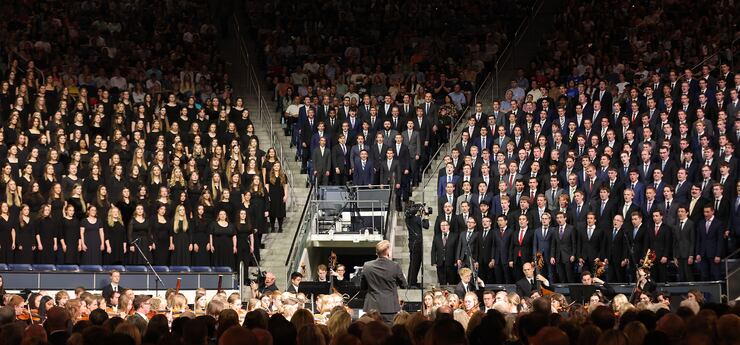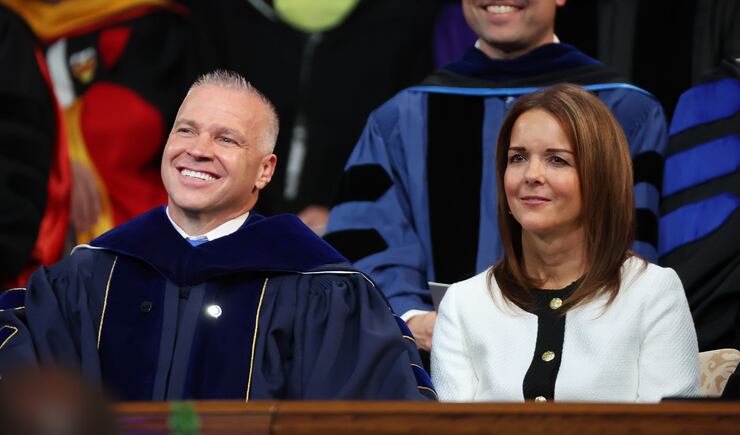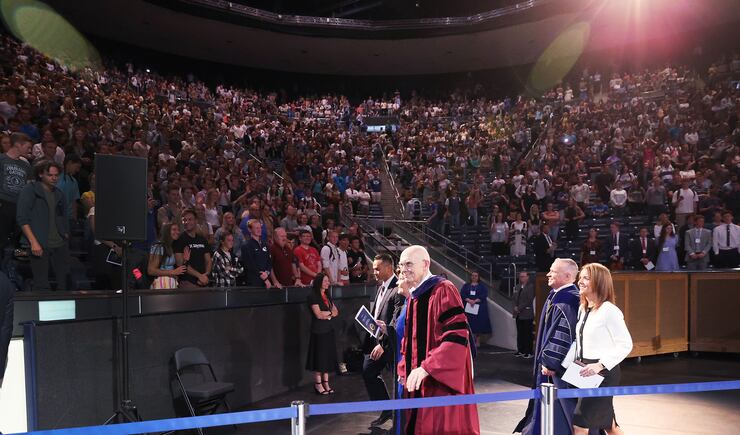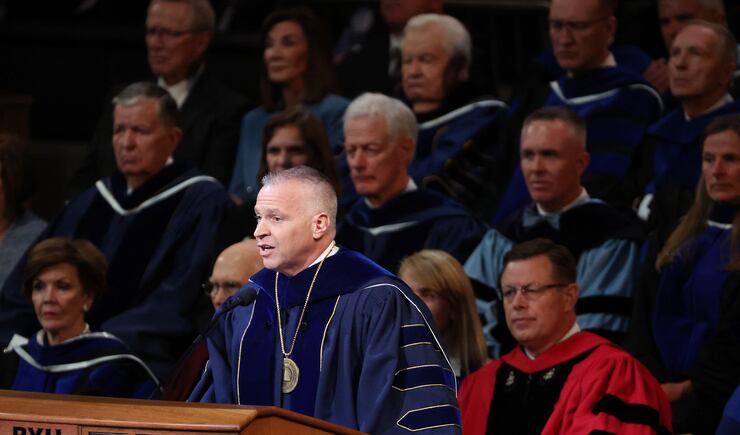The newly installed president of Brigham Young University, C. Shane Reese, is about as thoroughly a product of BYU as mint brownies, stone-cold sobriety, tunnel singing, and ill-advised mustaches.
However, much more importantly, Reese’s BYU journey — as a student, scholar of statistics and latter-day disciple of Jesus Christ — bears the markers of BYU’s unique consilience of academic excellence and deeply-rooted religious commitment. Wall Street Journal recently ranked BYU among the nation’s top 20 universities, and The Princeton Review has BYU atop its list of “most religious” schools.
But Reese’s journey of becoming BYU, a phrase repeated multiple times during Tuesday’s inauguration, started humbly enough as a nervous first-generation freshman — doubtful of whether he could succeed on campus.
Often that’s how the path of becoming begins.
Peruse the pages of holy writ and it’s hard to miss the stories of those who, through God’s touch, defy the odds. The grand sweep of scripture tells us weak things can be made strong. Through small things, great things can be wrought.
In Christ’s parables, he compares the kingdom of God to seeds and salt; to lamps and leaven. In simple things, Christ sees something more. Seeds become trees. Salt adds savor. Leaven lifts. Lamps light homes and cities on hills. Or, if you prefer, Ys on mountains.
BYU began as a ragtag academy with 120 pupils in a room that could only fit 103. BYU is much more today, and yet it still has loftier, spiritual purposes to be achieved. Reese made it abundantly clear that’s priority one through 100 as BYU enters its 150th year.
At Tuesday’s inauguration, Elder D. Todd Christofferson and Elder Ronald A. Rasband of the Quorum of the Twelve Apostles of The Church of Jesus Christ of Latter-day Saints — and both members of BYU’s board of trustees’ executive committee — spoke of the school’s charge to renew its focus on academic excellence and spiritual commitment, even and especially amid tumultuous times.
The Church Commissioner of Education, Elder Clark G. Gilbert, called what’s happening and will happen on campus a spiritual rebirth and rejuvenation pouring across the campus.
Such spiritual rejuvenation is increasingly difficult to sustain on America’s college campuses. It requires concerted effort to “dare to be different” — or, in the parlance of statistics, defy the odds at a time when most American universities are trending secular.
To achieve BYU’s mission in the second half of the school’s second century, Reese said BYU must focus on mission-inspired scholarship, including the importance of family and religion in human flourishing as well as constitutional government and research addressing issues such as poverty and peacemaking, among other areas inspired by the teachings of BYU’s sponsoring institution, The Church of Jesus Christ of Latter-day Saints.
BYU’s dual spiritual and academic mission, Reese said, will also require hiring faculty who embody the university’s distinct values. Faculty and staff must serve as models of disciple-scholars who can help inspire and mold students to reach their greatest spiritual and intellectual potential.
“Our task is to claim in our day the prophesies of the past. Our task is to become the university that prophets foretold,” Reese said. “This, then, is the challenge of our generation and the burden of my administration: becoming BYU.”
The philosopher Aristotle uses the word “telos” — meaning end or final cause — to describe an object’s highest purpose. We can’t truly know the nature of something, Aristotle contends, until we understand its final cause. Just as the acorn’s final end may be to become an oak, BYU’s charge Tuesday was to become the “greatest institution of learning” and “the fully anointed university of the Lord.”
But to what end, you might ask — to what telos?
That freshman year, when C. Shane Reese was down and out, his Latter-day Saint bishop back in Albuquerque suggested he speak with the bishop’s brother — a new faculty member at BYU Law School. That bishop’s brother was Kevin J. Worthen, the same Worthen Reese now succeeds as BYU’s 14th president.
Reese divulged Tuesday that Worthen’s nickname in those days was “Zeus.” Worthen may not have commanded thunderbolts from atop Y Mountain, but on that day, in that hour, when Reese needed it, he helped shape that young freshman’s path, assuring him he could succeed.
Reese left the meeting and called his mom. He’d stick it out at BYU, he said.
Soon Reese discovered his passion for statistics. He went on to graduate school and returned to campus as a faculty member. Tuesday, he became BYU’s president. Elder Christofferson, reflecting on Reese’s story, and in a winking nod to Reese’s scholarly interests, wondered out loud, “What are the odds?”
Whatever they are, I pray BYU continues to become a place that defies them.

